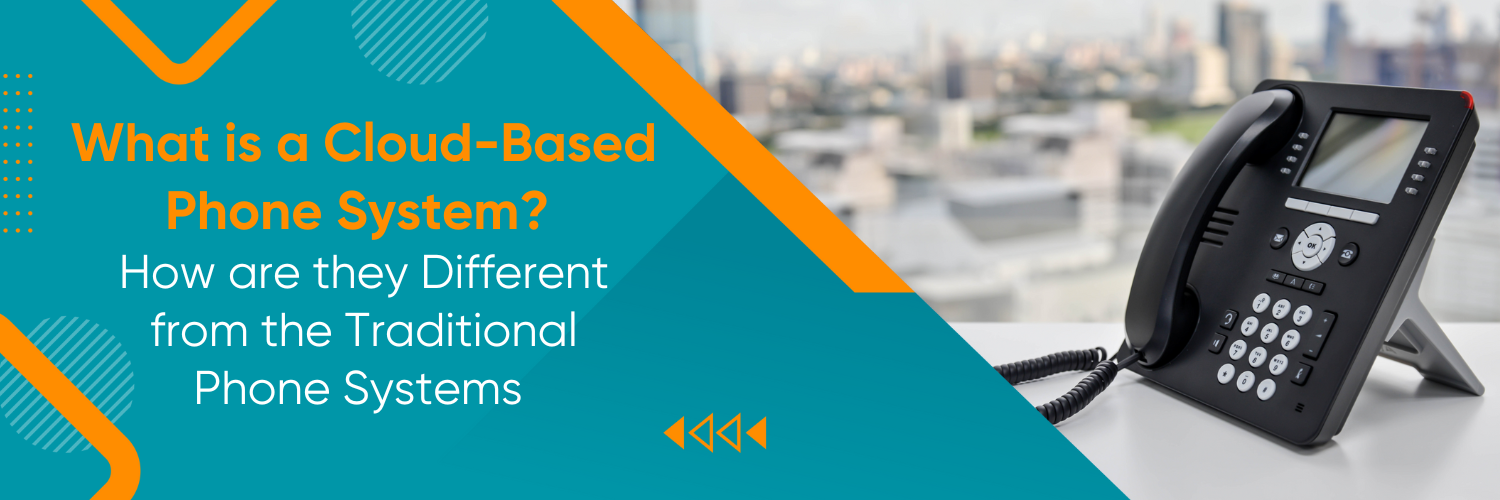What is a Cloud-Based Phone System?

A cloud-based phone system, also known as a virtual phone system or hosted PBX (Private Branch Exchange), is a modern communication solution that operates through the internet instead of traditional phone lines. It has gained significant popularity and adoption due to its numerous advantages over conventional phone systems. By leveraging the power of the cloud, businesses can enhance their communication capabilities, improve efficiency, and reduce costs.
Understanding Cloud-Based Phone Systems

A cloud-based phone system is a telecommunications system that uses the internet to transmit voice and data. It eliminates the need for physical infrastructure and allows businesses to manage their phone system through a web-based interface. Some key features of a cloud-based phone system include virtual phone numbers, voicemail, call forwarding, auto-attendants, and interactive voice response (IVR) systems. These features enable businesses to have a professional and flexible phone system without the complexity and high costs associated with traditional on-premises systems.
Compared to traditional phone systems that require physical hardware and extensive setup, cloud-based phone systems are easy to deploy and scale. They offer greater flexibility, allowing employees to make and receive calls from anywhere using various devices such as smartphones, laptops, or desk phones. Additionally, cloud-based phone systems offer significant cost savings by eliminating the need for expensive hardware, maintenance, and dedicated phone lines.
How Does a Cloud-Based Phone System Work?

Cloud-based phone systems rely on Voice over Internet Protocol (VoIP) technology to transmit voice signals over the Internet. When a call is made, the voice data is converted into digital packets and transmitted through the internet to the recipient. This process eliminates the need for traditional phone lines and allows for seamless communication across different locations.
The backbone of a cloud-based phone system is a network of data centers operated by cloud providers. These data centers host the necessary infrastructure and software to handle and route calls. When a call is received, it is routed through the data centers and directed to the intended recipient’s device. This infrastructure ensures reliable and high-quality communication, even during peak usage times.
Features and Benefits of Cloud-Based Phone Systems

Scalability
One of the key advantages of cloud-based phone systems is their scalability. Businesses can easily add or remove phone lines and extensions as their needs change. Whether the business experiences growth or downsizing, scaling the phone system can be done quickly and effortlessly.
Cost Savings
Cloud-based phone systems offer significant cost savings compared to traditional phone systems. There is no need to invest in expensive hardware or maintenance. Instead, businesses pay a predictable monthly subscription fee based on the number of users or extensions they require. Additionally, long-distance and international calls are often more affordable through VoIP, resulting in reduced communication expenses.
Flexibility and Mobility
Cloud-based phone systems enable employees to use the system from anywhere, as long as they have an internet connection. Calls can be made and received on various devices, including smartphones, laptops, and desk phones. This flexibility allows for remote work, collaboration, and seamless communication between team members, regardless of their location.
Advanced Features
Cloud-based phone systems offer a wide range of advanced features that enhance productivity and professionalism. These features include call routing, which allows calls to be forwarded to different extensions or devices based on specific rules. Voicemail-to-email functionality ensures that voicemails are delivered to email inboxes, making it easier to manage and respond to messages. Virtual attendants greet callers with customized messages and provide self-service options, improving the overall caller experience.
Factors to Consider when Choosing a Cloud-Based Phone System

- Reliability and Uptime
When selecting a cloud-based phone system, it’s crucial to consider the reliability and uptime guarantees provided by the service provider. Downtime can disrupt business operations, so it’s important to choose a provider with a proven track record of high availability and reliable service.
- Integration Capabilities
Businesses often rely on various tools and applications to streamline their operations. It’s important to ensure that the chosen cloud-based phone system can seamlessly integrate with existing business tools, such as customer relationship management (CRM) software, collaboration platforms, or help desk systems. The integration allows for a unified communication experience and simplifies workflows.
- Security
Protecting sensitive communications and data is a top priority for businesses. When evaluating cloud-based phone systems, consider the security measures implemented by the service provider. Look for encryption protocols, secure data centers, and compliance with industry standards such as GDPR (General Data Protection Regulation) or HIPAA (Health Insurance Portability and Accountability Act), depending on your industry requirements.
Use Cases and Industries that Benefit from Cloud-Based Phone Systems

- Cloud-based phone systems are beneficial for a wide range of industries and use cases.
- Small businesses can leverage the affordability and scalability of cloud-based systems to establish a professional communication infrastructure without significant upfront costs.
- Remote teams can take advantage of the flexibility and mobility offered by cloud-based systems to collaborate effectively and stay connected, regardless of their location.
- Call centers and customer support teams can benefit from the advanced features of cloud-based phone systems, such as call routing and virtual attendants, to enhance customer experience and streamline operations.
- Cloud-based phone systems are also suitable for businesses with multiple office locations, as they can easily connect and centralize communication across all branches.
- A marketing agency that improved customer service by implementing a cloud-based phone system, enabling seamless call forwarding and voicemail management.
- A healthcare provider streamlined communication between clinics and remote staff using cloud-based systems, ensuring uninterrupted patient care and efficient collaboration.
Conclusion

Cloud-based phone systems have revolutionized business communication. By leveraging VoIP technology and the power of the cloud, these systems offer flexibility, scalability, advanced features, and cost savings. Businesses of all sizes and industries can benefit from cloud-based phone systems, whether it’s improving customer service, enabling remote work, or streamlining operations.
Embracing a cloud-based phone system allows businesses to stay agile and adapt to changing communication needs. As technology continues to evolve, it’s essential to explore the possibilities of cloud-based phone systems and consider implementing them as an integral part of your communication infrastructure.
Conclusion
Embracing a cloud-based phone system allows businesses to stay agile and adapt to changing communication needs. As technology continues to evolve, it’s essential to explore the possibilities of cloud-based phone systems and consider implementing them as an integral part of your communication infrastructure. With their numerous advantages and the ability to support various use cases, cloud-based phone systems are poised to shape the future of business communication.
Partnering with a knowledgeable and reliable service provider like Ubique Digital Solutions ensures a seamless transition and ongoing support. If you are ready to enhance your communications and set your business on a trajectory for success, do not delay. Partner with Ubique Digital Solutions, their team of experts is ready to work with you to tailor a solution that meets your unique needs. Make the smart choice and contact Ubique Digital Solutions today for a tomorrow that is bound to be brighter and more connected.
FAQs
Q: How is a cloud-based phone system different from a traditional phone system?
A cloud-based phone system operates over the internet, while a traditional phone system relies on physical infrastructure and dedicated phone lines. Cloud-based systems offer flexibility, scalability, advanced features, and cost savings compared to traditional systems.
Q: What equipment is needed to set up a cloud-based phone system?
To set up a cloud-based phone system, you typically need IP phones or softphones (software-based phones), a reliable internet connection, and a subscription to a cloud-based phone system provider. The provider will guide you on the specific requirements and setup process.
Q:What happens if there is an internet outage?
During an internet outage, the cloud-based phone system may experience disruptions. However, many providers offer failover options, such as call forwarding to mobile phones or alternative phone lines, to ensure business continuity even in the event of an internet outage.
Q: How secure are cloud-based phone systems?
Cloud-based phone systems prioritize security and implement measures such as encryption protocols, secure data centers, and compliance with industry standards. However, it’s important to choose a reputable provider and follow best practices for securing user accounts and data.
Q: Can a cloud-based phone system support multiple office locations?
Yes, cloud-based phone systems are well-suited for multiple office locations. They enable centralized communication, call routing between locations, and unified management of the phone system through a web-based interface. Businesses can connect all their offices seamlessly using a cloud-based phone system.












